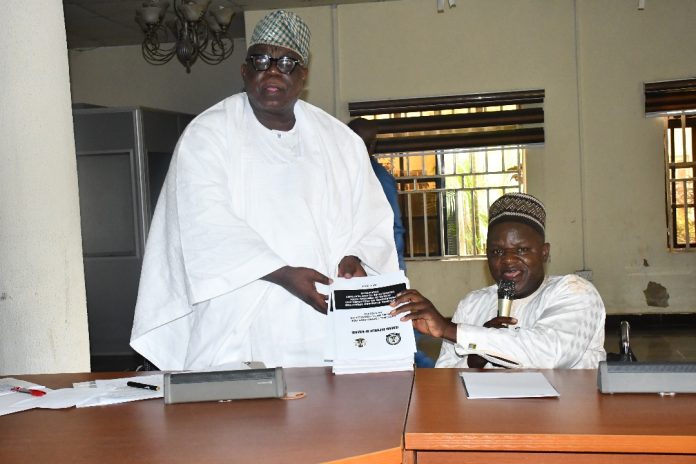Abuja, Nigeria – In a significant step towards inclusivity, the Executive Secretary of the National Commission for Persons with Disabilities (NCPWD), Chief Ayuba Gufwan, has lauded the Federal Government’s pledge to fully implement the 5% employment quota for Persons with Disabilities (PWDs) across all Ministries, Departments, and Agencies (MDAs). The commitment is part of the Discrimination Against Persons with Disabilities (Prohibition) Act of 2018, which mandates that PWDs must be adequately represented in public sector employment.
Chief Gufwan made these remarks during a courtesy visit to the Federal Civil Service Commission (FCSC) in Abuja, where he expressed his gratitude to the Commission’s Chairman, Professor Tunji Olaopa, for his unwavering support in enforcing this crucial mandate. Gufwan highlighted the importance of ensuring that qualified PWDs are given fair opportunities in the federal workforce, stressing that inclusivity in employment is a key component of the broader agenda for the rights and welfare of PWDs in Nigeria.
“We commend the Federal Government for its commitment to the full implementation of the 5% employment quota for Persons with Disabilities in all MDAs. This is a positive step in the right direction, and we appreciate the efforts of the Federal Civil Service Commission in upholding this mandate,” Gufwan stated.
However, the Executive Secretary noted that despite the positive strides, there remains a concerning issue of low compliance among some government agencies and officials. Gufwan emphasized that many recruitment processes still fail to prioritize reasonable accommodations for PWDs, thereby hindering their access to federal employment opportunities.
“The low compliance rate in some sectors is worrisome, and we are calling on all MDAs to give priority to reasonable accommodations during recruitment processes. Many qualified PWDs are capable of contributing significantly to the civil service, yet they remain marginalized due to systemic barriers,” he explained.
Gufwan also highlighted the challenges faced by talented young PWDs, especially those in remote areas who often go unnoticed due to inadequate infrastructure and limited outreach. He stressed the importance of identifying and supporting these individuals, who have the qualifications but are not being adequately recognized for employment.
“We have many bright and talented PWDs across the country, especially in rural areas. Unfortunately, due to poor infrastructural networks, many of these individuals are overlooked during recruitment. We are committed to gathering accurate data on all clusters of disabilities to ensure that no one is left behind,” he added.
The Executive Secretary announced that the NCPWD would soon embark on a comprehensive data-gathering exercise to document PWDs across Nigeria. This initiative, he said, would help ascertain the actual status and employment readiness of individuals with disabilities, providing a foundation for targeted recruitment and support programs.
In response, the Chairman of the Federal Civil Service Commission, Professor Tunji Olaopa, commended Chief Gufwan and the entire team at NCPWD for their relentless efforts in advocating for the rights of PWDs. Olaopa acknowledged that while progress has been made, more work is needed to fully implement the employment quota across all MDAs.
Olaopa noted that the Federal Ministry of Education had already exceeded the mandated 5% employment quota for PWDs, achieving an impressive 6% representation. He expressed optimism that other MDAs would follow suit, making significant strides toward inclusivity in their recruitment processes.
“The Federal Ministry of Education has set a commendable example by surpassing the 5% quota, reaching 6% in the employment of PWDs. This is a milestone that we believe can be replicated across other MDAs. We are committed to supporting the full implementation of the quota, ensuring that qualified PWDs are given the opportunities they deserve,” Olaopa said.
To further enhance communication and streamline processes, Olaopa also announced that the Federal Civil Service Commission would establish dedicated desk officers for PWDs within the Commission. This move is aimed at improving coordination between the NCPWD and the FCSC, ensuring that issues related to PWD employment are addressed promptly and efficiently.
“We are pleased to partner with the NCPWD in ensuring that PWDs have a voice within the Federal Civil Service. The establishment of desk officers will facilitate smoother communication and help address any challenges that may arise,” Olaopa explained.
The meeting concluded with the presentation of NCPWD’s Six-Point Agenda to the Chairman of the Federal Civil Service Commission. This agenda outlines the Commission’s strategic priorities for advancing the rights and welfare of PWDs, focusing on areas such as employment, accessibility, education, and healthcare.
The Six-Point Agenda represents a comprehensive roadmap for the NCPWD’s efforts to promote inclusivity and protect the rights of PWDs in Nigeria. With continued collaboration between key stakeholders like the Federal Civil Service Commission and NCPWD, the future looks promising for PWDs as the nation works towards a more inclusive and equitable society.
About the National Commission for Persons with Disabilities (NCPWD)
The NCPWD was established following the enactment of the Discrimination Against Persons with Disabilities (Prohibition) Act in 2018. The Commission is dedicated to ensuring the full inclusion and participation of Persons with Disabilities in all aspects of national life, advocating for their rights, and promoting policies that enhance their welfare.
About the Federal Civil Service Commission (FCSC)
The FCSC is responsible for overseeing the recruitment, promotion, and discipline of federal civil servants in Nigeria. The Commission plays a critical role in ensuring that employment opportunities within the federal service are accessible to all Nigerians, including Persons with Disabilities, in line with the provisions of the Discrimination Against Persons with Disabilities (Prohibition) Act.


